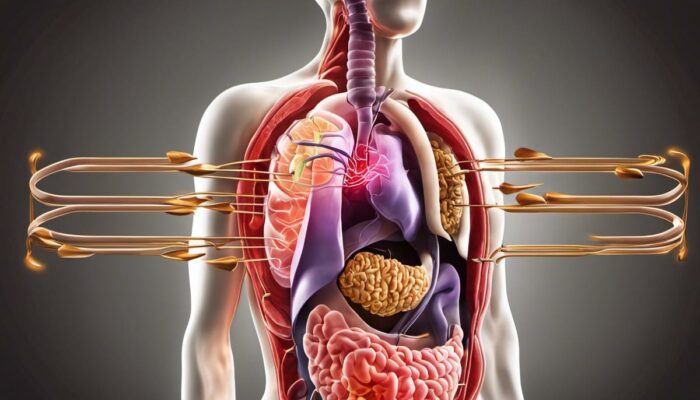
Are Proton Pump Inhibitors Bad For You? If you suffer from indigestion, GERD, Acid Reflux, or any issues related to your stomach acid then you may have been given Proton Pump Inhibitors (PPI) by your doctor. Probably as a prescription. It may well be that you have been taking PPI for years and maybe they might help but are they really safe long-term?
Can you continue to take them without any negative side effects? This is the question, and some recent studies suggest there could be long-term side effects. According to some sources, these might include;
- Kidney Disease
- Osteoporosis,
- Low Magnesium (Hypo-Magnesmia)
- Vitamin B12 Deficiency
- Stroke, and
- Infection from Harmful Bacteria such as Clostridium Difficile (C. diff)
Not really worth it if true, surely? and especially since other options can be considered but before we do how much of this is true? Let’s dive in and find out…
Are Proton Pump Inhibitors Bad For You?
For anyone wondering about if Proton pump inhibitors (PPIs) are bad for you, PPIs are a class of medications that are commonly used to reduce stomach acid. They are widely prescribed for conditions such as gastroesophageal reflux disease (GERD), peptic ulcers, and dyspepsia.
However, while PPIs are effective at treating these conditions, they have also been the subject of controversy due to concerns about their potential risks and side effects.
In this article, we will explore exactly this and whether or not the benefits outweigh the risks of taking PPIs, or if on the other hand PPIs should be completely avoided! I am not a doctor or a qualified health professional, I will just quickly mention this and this information is not meant to replace professional advice but let’s actually look at this information.
Are Proton Pump Inhibitors Safe? I will let you decide.

Now let’s continue…
What Are Proton Pump Inhibitors (PPIs)
<iframe width=”560″ height=”315″ src=”https://www.youtube.com/embed/HOvtEMuU5fU” title=”YouTube video player” frameborder=”0″ allow=”accelerometer; autoplay; clipboard-write; encrypted-media; gyroscope; picture-in-picture; web-share” allowfullscreen></iframe>
Proton pump inhibitors (PPIs) are a class of medications that are used to reduce the production of stomach acid. They work by blocking the enzyme in the stomach lining that produces acid, known as the proton pump.
By inhibiting this enzyme, PPIs can help to alleviate the symptoms of conditions related to excessive stomach acid, such as gastroesophageal reflux disease (GERD), peptic ulcers, and Zollinger-Ellison syndrome.
The first PPI, Omeprazole, was developed in the late 1970s by a team of researchers at the Swedish pharmaceutical company Astra AB. The team was led by Drs. Bengt Andersson and Olle Ekberg. Two scientists who were both investigating ways to treat stomach acid-related conditions more effectively.
Omeprazole was first introduced to the market in 1988 under the brand name Losec and quickly became a popular treatment for GERD and peptic ulcers. Since then, several other PPIs have been developed and approved for use, including esomeprazole (Nexium), lansoprazole (Prevacid), pantoprazole (Protonix), and rabeprazole (Aciphex).
Today, PPIs are among the most widely prescribed medications in the world, with millions of people using them to treat acid-related conditions. However, their widespread use has also been the subject of controversy, with concerns about their potential side effects and long-term risks.
However, despite these concerns, PPIs remain an important treatment option for many patients with acid-related conditions, and ongoing research is exploring ways to optimize their use and minimize their potential risks.
How Proton Pump Inhibitors Actually Work
PPIs work by blocking the proton pump in the cells of the stomach that produce acid. By doing so, they reduce the amount of acid that is produced and help to alleviate the symptoms of stomach acid-related conditions.
PPIs are typically prescribed for conditions such as GERD, where they are effective at reducing symptoms such as heartburn and acid reflux. They are also used to treat other conditions related to excessive stomach acid production, including peptic ulcers, Zollinger-Ellison syndrome, and non-ulcer dyspepsia.
For Peptic Ulcers…
Peptic ulcers are sores that develop on the lining of the stomach or small intestine, usually as a result of infection with the bacterium Helicobacter pylori or the use of nonsteroidal anti-inflammatory drugs (NSAIDs). PPIs can help to heal these ulcers by reducing the amount of acid in the stomach and allowing the tissue to heal.
For Zolinger-Ellison Syndrome…
Zolinger-Ellison Syndrome is a rare condition in which tumors develop in the pancreas or duodenum and produce excessive amounts of a hormone called gastrin. Gastrin stimulates the production of acid in the stomach, leading to the development of peptic ulcers and other complications.
PPIs are used to block the production of acid in these patients and reduce their symptoms.
For Non-ulcer Dyspepsia…
This is a condition in which patients experience symptoms such as bloating, nausea, and abdominal pain, but do not have an underlying peptic ulcer or other detectable abnormality. PPIs may be prescribed in these cases to reduce symptoms and improve the overall quality of life.
In Summary
PPIs are a widely used and effective treatment for acid-related conditions, and whilst they are associated with potential risks and side effects, their benefits for many patients outweigh these risks.
Patients who are considering PPI therapy should discuss the benefits and risks with their healthcare provider and explore alternative treatment options if appropriate. PPIs may help to heal ulcers by reducing the amount of acid in the stomach and allowing the tissue to heal but at the same time, there are possible risks too.
What Are The Potential Risks of PPIs

The potential risks of Proton Pump Inhibitors are certainly something that should be considered before taking PPIs. Despite their effectiveness, PPIs have long been associated with a range of potential risks and side effects.
Short-term and less serious risks include nausea, diarrhea, and headaches, while long-term and more serious risks include;
- Increased Risk of Bone Fractures,
- Kidney Disease,
- And Even Dementia.
Additionally, there is some evidence that long-term use of PPIs may lead to an increased risk of infections, such as Pneumonia and Clostridioides Difficile (C. diff) infection.
This is not really conclusive. More studies must be taken to further determine this but for anyone that might be worried these are just some things that you should be aware of.
However, of course, as well as the risks there are the actual benefits…
What Are The Main Benefits of PPIs
The main benefits of Proton Pump Inhibitors can be quite obvious to people who take them. They can provide significant benefits and relief to patients with stomach acid-related conditions.
PPIs have been shown to improve symptoms and quality of life in patients with GERD and other stomach acid-related conditions. They are also effective at preventing the recurrence of peptic ulcers and reducing the risk of complications such as bleeding and perforation.
They are also often preferred over other medications for acid-related conditions because they are more effective at reducing stomach acid production and providing longer-lasting relief. Unlike antacids, which work by neutralizing stomach acid, PPIs actively inhibit acid production at its source.
In addition to treating symptoms, PPIs can also have a positive impact on overall health outcomes for patients with stomach acid-related conditions. By reducing the risk of complications such as bleeding and perforation of peptic ulcers, PPIs can help to prevent more serious health problems from developing.
For patients with GERD, PPIs can also help to reduce the risk of developing complications such as esophageal strictures, Barrett’s esophagus, and esophageal cancer. These conditions can develop when acid reflux causes damage to the lining of the esophagus over time.
Overall, the benefits of PPIs for patients with stomach acid-related conditions are numerous and significant. However, patients should be aware of the potential risks and side effects of these medications and work with their healthcare provider to determine if PPI therapy is the best treatment option for their individual needs.
If it is not or if you simply just want to take precautions against possible reported risks of taking PPIs then there are a few different options that can be considered.
Alternative Treatments To Proton Pump Inhibitors
Alternatives to proton pump inhibitors for patients who are concerned about the potential risks of PPIs are there for those who choose to do so. Lifestyle modifications such as giving up alcohol, weight loss, and dietary changes can help to reduce symptoms of acid reflux.
Additionally, H2 blockers and antacids are alternative medications that can be used to reduce stomach acid and alleviate symptoms. But also another idea for treatment is Betaine HCL Supplements.
Interestingly, these do not limit stomach acid but increase it. This might sound absurd to those that constantly struggle with the pain of stomach acid-related issues but apparently, stomach acid deficiency is a very real thing and is surprisingly very often the cause of these problems.
I will link to related content here<<
My Thoughts On PPIs
I am someone that has definitely suffered from stomach acid issues. Mostly due to alcohol but anyway, I was given Omeprazole as a prescription maybe 10-15 years ago and after taking it 2-3 times I had to stop because they were making me ill. I know a lot of people that still take Omeprazole or Gaviscon for their stomach acid issues. Some people I have found will even take expired medication because they are so desperate for it.
Even my own Mother has to make sure that this is in her prescription. To her, this is more important than Insulin most of the time but seriously many people I think will never look past this medication. To them, the side effects are a necessary evil which is understandable I think with how unbearable conditions like heartburn and excessive stomach acid are.
However, I do personally think it is sensible to look at other options. Certainly, lifestyle changes before anything else but also Antacids and Betaine HCL supplements are worth a try.
In Conclusion
So, PPIs are certainly effective at reducing stomach acid and alleviating symptoms of stomach acid-related conditions. Probably the majority of people who take these medications such as Omeprazole and Prilosec will tell you this.
Many people happily take PPIs daily to help relieve conditions such as GERD and Acid Reflux.
But, however, the trouble with PPIs and reducing stomach acid production is also associated with potential risks and side effects that should be considered when deciding whether to use them.
Patients should work with their healthcare provider to weigh the benefits and risks of PPI therapy and explore alternative treatment options if appropriate. Some of these I have mentioned but I will leave the rest up to you.
Your Feedback
Finally, if you have found this content helpful today please give this a share on social media so others can find this and read it. Also if you have any questions or would like to leave feedback please do so in the comments section below. We will look to respond in a timely manner. Your feedback is important to us.
Thanks for stopping by and till next time.
#StayDynamic
Alex B. Chivers
DynamicIdeas4Life.com
Contact Us at: chivs86@dynamicideas4life.com
Related FAQs
- What are the potential side effects of PPIs? Answer: Like all medications, PPIs can have side effects. Some of the most common side effects include headache, nausea, diarrhea, and abdominal pain. Long-term use of PPIs has also been associated with an increased risk of bone fractures, kidney disease, and certain infections. Patients should be aware of these risks and work with their healthcare provider to determine if PPI therapy is appropriate for their individual needs.
- Can PPIs be taken with other medications? Answer: In general, PPIs are safe to take with other medications. However, patients should inform their healthcare provider of all medications they are taking, including over-the-counter and herbal supplements, to ensure that there are no potential interactions that could cause harm.
- Are PPIs safe for pregnant women? Answer: The safety of PPIs during pregnancy is not fully established. While some studies have suggested that PPIs are safe to use during pregnancy, others have raised concerns about potential risks to the developing fetus. Pregnant women should consult with their healthcare provider before taking PPIs.
- Can PPIs be taken long-term? Answer: PPIs are generally safe for short-term use, but there is some concern about their long-term use. Long-term use of PPIs has been associated with an increased risk of certain health problems, including bone fractures and kidney disease. Patients who require long-term PPI therapy should be monitored regularly by their healthcare provider to ensure that the benefits of treatment outweigh the potential risks.
- Can PPIs be purchased over-the-counter? Answer: Yes, some PPIs are available over-the-counter (OTC) without a prescription. However, patients should use caution when taking OTC PPIs and should only use them as directed. Patients with more severe or persistent symptoms should seek medical advice before taking any medication.
- Can PPIs be used to treat all types of stomach problems? Answer: No, PPIs are only effective at reducing stomach acid production and alleviating symptoms related to excessive acid production. They are not effective at treating other types of stomach problems, such as bacterial infections or inflammation.
- How quickly do PPIs work? Answer: PPIs typically begin to work within a few hours of taking the first dose, but may take several days or weeks to reach their full effect. Patients should be aware that PPIs are not intended for immediate relief of symptoms and should not be used for emergency situations.
- Are there alternatives to PPIs? Answer: Yes, there are several alternatives to PPIs that can be used to treat acid-related conditions. These include H2 blockers, antacids, and lifestyle modifications such as dietary changes and weight loss. Patients should discuss all treatment options with their healthcare provider to determine the best approach for their individual needs.
- Can PPIs be stopped abruptly? Answer: No, patients should not stop taking PPIs abruptly without consulting their healthcare provider. Abruptly stopping PPI therapy can cause rebound symptoms, which may be worse than the original symptoms.
- Do PPIs increase the risk of cancer? Answer: The relationship between PPI use and cancer risk is not fully understood. Some studies have suggested a potential link between long-term PPI use and an increased risk of certain types of cancer, but more research is needed to fully understand this relationship. Patients should discuss any concerns about PPI therapy and cancer risk with their healthcare provider.
References
- Kahrilas PJ, Shaheen NJ, Vaezi MF; American Gastroenterological Association Institute Clinical Practice and Quality Management Committee. American Gastroenterological Association Institute technical review on the management of gastroesophageal reflux disease. Gastroenterology. 2008;135(4):1392-1413.
- DeVault KR, Castell DO; Practice Parameters Committee of the American College of Gastroenterology. Updated guidelines for the diagnosis and treatment of gastroesophageal reflux disease. Am J Gastroenterol. 2005;100(1):190-200.
- Peura DA, Kovacs TO; Panel Members. The management of adult patients with peptic ulcer disease. Am J Gastroenterol. 1997;92(4):639-646.
- Lanas A, Scheiman J; Low-Dose Aspirin-Associated Ulcer Complications Study Group. Low-dose aspirin and upper gastrointestinal damage: epidemiology, prevention and treatment. Curr Med Res Opin. 2007;23(1):163-173.
- Gomm W, von Holt K, Thomé F, et al. Association of proton pump inhibitors with risk of dementia: a pharmacoepidemiological claims data analysis. JAMA Neurol. 2016;73(4):410-416.
- FDA. Proton Pump Inhibitor (PPI) Information. Accessed on April 19, 2023 from https://www.fda.gov/drugs/drug-safety-and-availability/proton-pump-inhibitor-ppi-information.
- Katz PO, Gerson LB, Vela MF. Guidelines for the diagnosis and management of gastroesophageal reflux disease. Am J Gastroenterol. 2013;108(3):308-328.
- Stollman N, Metz DC. Pathophysiology and management of gastric ulcer disease. Med Clin North Am. 2002;86(6):1447-1466.
- Moayyedi P, Eikelboom JW, Bosch J, et al. Safety of proton pump inhibitors based on a large, multi-year, randomized trial of patients receiving rivaroxaban or aspirin. Gastroenterology. 2019;157(3):682-691.e2.
Tweets:
- Proton pump inhibitors (PPIs) are commonly used for stomach acid-related conditions, but are they bad for you? Check out our latest blog post to find out! #PPIs #health #blogpost
- Did you know that PPIs can provide significant benefits and relief to patients with GERD and other stomach acid-related conditions? Learn more about the main benefits of PPIs in our latest blog post. #GERD #PPIs #health
- Are PPIs safe to use long-term? Our latest blog post explores the potential risks and benefits of proton pump inhibitors for stomach acid-related conditions. #PPIs #health #blogpost
Pinterest description: Proton pump inhibitors (PPIs) are commonly used for stomach acid-related conditions, but there is some controversy surrounding their use. Our latest blog post explores the potential risks and benefits of PPIs and why they are prescribed, as well as the main benefits and potential side effects. Check it out to learn more about PPIs and their impact on your health. #PPIs #health #blogpost
- #PPIs
- #GERD
- #acidreflux
- #heartburn
- #stomachacid
- #digestivehealth
- #gastroenterology
- #protonpumpinhibitors






